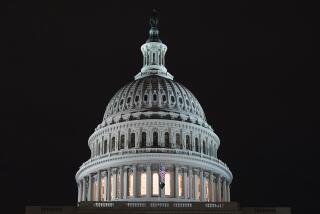Bush to Accept Taxes on Budget Summit Agenda
- Share via
WASHINGTON — President Bush on Sunday night urged Democratic leaders in Congress to join him in a summit meeting to trim the fiscal 1991 budget deficit. He pledged that nothing--not even the dreaded word “taxes”--would be excluded from the discussions.
“No preconditions--everything’s on the table,” Bush told the Democrats, according to House Minority Leader Robert H. Michel’s account of a 1 1/2-hour meeting between the President and the four top congressional leaders at the White House.
Although Democratic leaders did not immediately agree to a budget summit, House Speaker Thomas J. Foley (D-Wash.) told reporters afterward: “I think that’s going to be the outcome.”
Until now, Democrats in Congress have been reluctant to engage in budget summitry with Bush because they felt last year’s negotiations permitted the President to escape the budget crunch without facing up to the government’s need for new revenues. As a result, many Democrats have been demanding a pre-summit commitment from Bush to discuss raising taxes before they would agree to negotiate.
But Bush’s promise not to set “preconditions” was by no means a clear signal that he is ready to back away from the pledge that he made to the voters during his presidential campaign in 1988, when he repeatedly said: “Read my lips--no new taxes.”
Nevertheless, Michel, an Illinois Republican, predicted that the talks would produce a package that includes a tax increase. “I don’t know how you make these figures match without doing something on revenues,” he told reporters. “And I don’t think we’re going to be talking about a small package of (revenues).”
In addition to Foley and Michel, the meeting in the White House family quarters was attended by Senate Majority Leader George J. Mitchell (D-Me.), Senate Minority Leader Bob Dole (R-Kan.), White House Chief of Staff John H. Sununu, Treasury Secretary Nicholas F. Brady and Budget Director Richard G. Darman.
Foley and Mitchell said that they intended to consult with Democrats in Congress before agreeing to any specific format for the budget negotiations. Michel indicated that the Democrats had promised a formal reply to the President’s proposal by next Wednesday.
Democrats in the House and Senate have scheduled caucuses next Tuesday to discuss the matter. Both Foley and Mitchell indicated that they would recommend to their colleagues that the Congress engage the President in negotiations.
All participants in the White House meeting emphasized that there was no discussion of new taxes between the President and the Democratic leaders. Nor did they decide on a deficit reduction target, although both sides appear to be closing in on a figure of $64 billion.
Michel said Bush’s tone during the meeting was an “inquiring” one. “He asked: ‘What do you think?’ And said: ‘I’m ready to do it,’ ” according to Michel.
Foley added: “The assumption is that all matters would be on the table, that we would not enter any talks with preconditions. There is goodwill on all sides in trying to find a way to deal with the fiscal and budget problems that face all of us. We need a major and meaningful effort.”
One of the key issues to be settled prior to the beginning of budget talks is who will sit at the table. Because many congressional committees have jurisdiction over these matters, dozens of members of Congress want to be involved. According to Michel, Bush himself offered to chair some--but not all--of the meetings.
The negotiations would become meaningless with more than 25 participants, according to Michel.
Although the group did not agree on a deadline for deciding on a deficit reduction package, Michel said the matter must be cleared up before Congress is called upon to raise the debt ceiling again in mid-July.
One reason that Democrats have been reluctant to participate in another summit is that the past budget summits have not had particularly successful results.
Last year, for example, the negotiations produced an agreement that was supposed to reduce the deficit to $99 billion. But the Congressional Budget Office now predicts that the deficit for fiscal 1990 could be as much as $159 billion.
Likewise, a deal between President Ronald Reagan and the Congress in November, 1987, provided for a deficit of $30 billion in fiscal 1988 and $46 billion in fiscal 1989. Nevertheless, the deficit was $155 billion in fiscal 1988 and $152 billion in fiscal 1989.
Bush’s proposed budget for fiscal 1991 calls for spending of $1.2 trillion.
More to Read
Get the L.A. Times Politics newsletter
Deeply reported insights into legislation, politics and policy from Sacramento, Washington and beyond. In your inbox twice per week.
You may occasionally receive promotional content from the Los Angeles Times.










